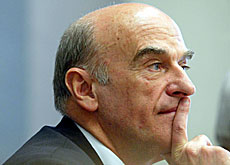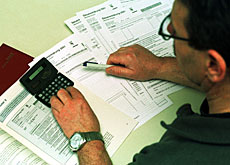Tax bill leaves the government short

Parliament has decided that government tax reforms, due to go to a nationwide vote in May, should include tax breaks to take account of inflation.
The inclusion of measures to counter the so-called “tax bracket creep” would reduce overall tax revenue by nearly SFr1 billion.
Parliament’s decision will strengthen the government’s case for pushing through tax reforms in May, according to political analyst Georg Lutz. But he says persuading voters to approve the whole package will still be tough.
“In recent weeks there has been a lot of confusion as to what would happen with the adjustment for the tax bracket creep,” he told swissinfo.
“The government realised that a clear stance had to be taken before May otherwise the chances of losing the vote would be increased.”
The measures approved by parliament are aimed at mitigating the effect of tax bracket creep. This occurs when inflation-related salary increases push workers into higher tax brackets, even though their spending power remains the same.
Swiss law requires the government to redress the balance when the accumulated inflation rate rises above seven per cent.
Lost revenue
The last adjustment was made in 1996 and cost the government SFr650 million in lost revenue.
The next modification is due in 2007, although most experts expect the seven per cent limit to be reached by the end of 2005.
While Lutz says most politicians agree with the principle of readjusting the tax bracket, he says including it in May’s vote will hit government coffers hard.
“If the readjustment is included it makes the impact of tax reform even greater [for the cantons and the federal government],” he said.
“Both central government and the cantons will lose even more revenue on top of the SFr2.6 billion [that will be lost as a result of the other reforms].
“But not including it would mean you start counting inflation from zero again and that would minimise the effect of the tax reform.”
Confusion
Politicians have come in for criticism from some sections of the Swiss media for not understanding the whole issue of tax readjustment.
Lutz admits the parliamentary debate will not have clarified matters for voters and there is bound to be some confusion in May’s vote.
“Following the debate in parliament, you had the impression that most of the politicians themselves didn’t understand the detail of what they were debating,” he said.
“Even the finance minister [Hans-Rudolf Merz] seemed to have some problems explaining the details and the consequences.
“When voters are also confused they have a tendency to vote for the status quo, and that would mean rejecting the government’s tax reforms.”
Such an outcome in May would not upset either the left-of-centre Social Democrats or the cantons.
Favour the rich
The Social Democrats insist that the proposed tax cuts are unfair because they favour those on higher incomes.
They also maintain that the proposed changes to property tax will mainly benefit the wealthy since only 30 per cent of the population own their own homes.
The cantons are unhappy with what they say are attempts by the federal government to control how taxes are levied and where the revenue is spent.
In Switzerland cantonal authorities have a mandate to impose their own taxes, as do local communities, and these make up the lion’s share of people’s tax bills. The federal government levies its own tax, but this makes up only about three to six per cent of the average couple’s total bill.
“Many cantons claim the reform is almost unconstitutional,” said Lutz.
“Up until now they had the right to say what was taxed and now they feel that central government is trying how and what should be taxed.”
swissinfo, Jonathan Summerton
The Swiss parliament has agreed to grant tax breaks to offset the impact of inflation or the “tax bracket creep”.
The government will include a readjustment in its tax reforms, which go to a nationwide vote on May 16.
Switzerland has a three-tier system of cantonal, local community and federal government taxes.
There are big differences in tax levels among the 26 Swiss cantons because the country’s federal system allows them to set their own tax rates.

In compliance with the JTI standards
More: SWI swissinfo.ch certified by the Journalism Trust Initiative

You can find an overview of ongoing debates with our journalists here. Please join us!
If you want to start a conversation about a topic raised in this article or want to report factual errors, email us at english@swissinfo.ch.